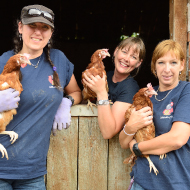
Centre will facilitate research for vets to use in their clinics
The British Hen Welfare Trust (BHWT) has launched an appeal to raise funds to finish the UK’s first-ever dedicated hen hospital.
The charity is currently in the final stages of building a dedicated Hen Welfare, Education and Visitor Centre at its headquarters in Devon. It aims to provide not just a space for rehoming hens but to host educational talks and perform pioneering veterinary treatment on hens.
BHWT's hopes to raise £5,000 to provide essential and lifesaving treatment for sick chickens and facilitate ground-breaking research for veterinary surgeons to use in their clinics. Among the equipment required includes a specialist examination table and lighting, post-operative bays, sterilisation and surgical instruments.
The campaign is being supported by ChickenGuard, manufacturers and sellers of automatic chicken coop door openers, which has selected the BHWT as its chosen charity for 2019/20.
ChickenGuard founder Ben Braithwaite commented: “Our mission at ChickenGuard is to protect the girls with our automatic chicken coop door openers, so choosing to support the BHWT in 2019/20 was simply natural, because the charity has been saving hens from slaughter for many years. It is a real privilege to be part of their journey in making their hen hospital a reality.”
Since it was established in 2005, the BHWT has rehomed more than 740,000 hens destined for slaughter. The charity believes all commercial laying hens deserve to enjoy a free-range lifestyle, including space to roam on green pasture and the chance to spread their wings.
BHWT founder Jane Howorth MBE said: “We are incredibly grateful to ChickenGuard and their customers for the support with our hen hospital. Our new Hen Welfare, Education and Visitor Centre has only been made possible through generous donations from our loyal supporters who care as much as we do about the welfare of laying hens across the country.
“It’s therefore really fitting to have the support of ChickenGuard, who were founded with the sole purpose of keeping chickens safe, to help us complete this bespoke hen hospital that will improve and enhance the lives of hundreds of hens over the years to come.”
Ms Howorth continued: “We can’t wait to open this new facility and to really see what difference we can make to the lives of these remarkable little animals, who bring so much joy to so many of us. On behalf of the hens, thanks again to ChickenGuard and all those who have supported us so far in making this a reality.”
For more information about the hen hospital, or to make a donation, visit the charity's JustGiving page.



 The veterinary mental health charity Vetlife is inviting the veterinary community to join it for a sponsored cold-water dip.
The veterinary mental health charity Vetlife is inviting the veterinary community to join it for a sponsored cold-water dip.